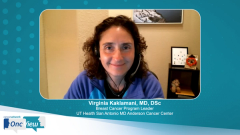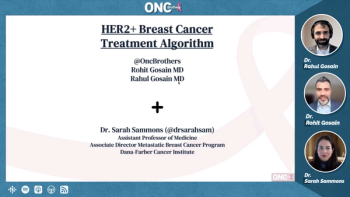
Goals of Care for HER2+ Breast Cancer
Virginia Kaklamani, MD, DSc, provides an overview of the goals of care for HER2+ breast cancer.
Matthew Fowler: Hello and welcome to this contemporary CancerNetwork® OncView™ programtitled “Treatment Options for Early-Stage HER2+ Breast Cancer.” I’m Matt Fowler, associate editor with CancerNetwork®. We have with us today Dr Virginia Kaklamani, professor of medicine in the Division of Hematology/Oncology at the University of Texas Health Science Center and leader of the Breast Cancer Program at UT Health San Antonio MD Anderson Cancer Center. Thank you so much for joining us today, Dr Kaklamani. Let’s start with the landscape of HER2-positive breast cancer. How do the goals of care differ for patients with early-stage vs metastatic HER2-positive breast cancer?
Virginia Kaklamani, MD, DSc: For early-stage breast cancer that’s HER2-positive, the goal is to cure and this means that our treatments might be a little bit longer and may have a little more toxicity because we’re trying to be as aggressive as we need to in order to cure the majority of these women. Hopefully, at some point, we can cure all of these women. Now, once a woman develops metastatic disease, then we have 2 goals. One is to improve their quality of life and the other one is to prolong their survival. We try to do both of these things at the same time. What’s important when we talk about treatment is that we give the right treatment to the right patient so that we don’t increase toxicities but we also help that individual live longer.
Matthew Fowler: For both of these groups, what is the general prognosis?
Virginia Kaklamani, MD, DSc: For early-stage HER2-positive breast cancer, the majority of these women are going to be cured. Depending on their stage of diagnosis, whether it’s stage I, II, or III, their rates of cure are different. For stage I HER2-positive breast cancer, the majority of these women, around 90%, if not more, will be cured. For stage II, that rate drops probably close to around 80%. For stage III, it will be around 70%. But for metastatic disease that’s HER2-positive, the overall survival has increased dramatically in the past 20 years with the addition of several targeted agents, antibodies against HER2-positive disease. Now that overall survival will probably be close to 3 years, and we do have women that have long-term stable disease, even complete responses where we can almost entertain the notion that we have cured women with metastatic HER2-positive breast cancer.
Matthew Fowler: How do you assess the risk of recurrence? What are some individual patient factors that might increase risk in patients with this disease?
Virginia Kaklamani, MD, DSc: The risk of recurrence in the early-stage HER2-positive disease depends on the stage but it also depends on the response to our neoadjuvant therapy. The majority of these women are going to receive neoadjuvant chemotherapy and anti-HER2 therapy. If they have a complete pathologic response, meaning no active disease at the time of surgery, then their chance of cure is close to 90%. But if they have a significant residual disease, then the chance of cure is much less and it can be even 60% or even less. It really makes a big difference what the response to our neoadjuvant therapy is. Other factors that might play a role are a woman’s age, other comorbidities, because that might change how well she tolerates our treatment. There are also 2 different kinds of HER2-positive breast cancer: the estrogen positive and the estrogen negative. So the treatment of these 2 subtypes is different because in the estrogen positive we also introduce anti-estrogen therapy, whereas in the estrogen negative, we rely on our anti-HER2 therapy to treat these individuals.
Transcript edited for clarity.
Newsletter
Stay up to date on recent advances in the multidisciplinary approach to cancer.

































